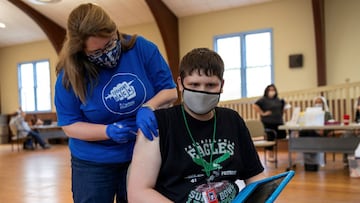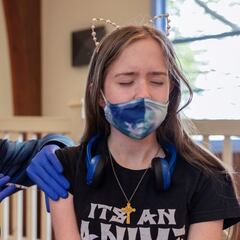Why are the Moderna and Johnson and Johnson vaccines not used on kids?
Pfizer, Moderna and Johnson & Johnson covid-19 vaccines approved for use in adults in the US are currently undergoing clinical trials in children.

Although kids are less likely to become seriously ill with covid-19 they will play a key role in reaching herd immunity. Of the three covid-19 vaccines that have received emergency use approval in the US, only Pfizer is approved for those 16 and older.
Pfizer has completed its clinical trials and submitted results for children 12 to 15 to the Food and Drug Administration (FDA) in early April. Canada authorized the company’s vaccine for use in this age group on Wednesday and approval is expected sometime this week in the US.
Also see:
- Will the nation's children be vaccinated before school begins in the fall?
- FDA expected to authorize Pfizer covid-19 vaccine for 12 to 15 age group
- Experts rubbish claims of covid-19 vaccine shedding
- US supports waiving coronavirus vaccine patents
The other two vaccines in use across the US, Moderna and Johnson & Johnson, have both begun clinical trials in children but of the two only Moderna is currently testing children under 18 in the US. Johnson & Johnson is testing children in the UK and Spain and plans to begin in the US shortly.
Pfizer has been leading the pack to FDA emergency use approval
Pfizer has been ahead in the race to get a working covid-19 to market giving it a leg up in for further clinical trials in younger age groups. Its emergency use authorization for those 18 and older came in mid-December followed shortly by Moderna. Johnsons & Johnson didn’t get emergency use approval for its covid-19 vaccine until the end of February.
Will you choose to vaccinate your child once the Pfizer COVID-19 vaccine is approved for kids as young as 12?
— WebMD (@WebMD) May 4, 2021
Pfizer was again first across the line when it completed enrollment for teens aged 12–15 in a clinical trial of its vaccine with over 2,200 participants in January. Moderna didn’t complete enrollment its clinical trials until February. At the time it enlisted 3,000 teens aged 12–17 in its own study. Moderna has yet to submit results to the FDA for emergency use.
Both companies are currently running clinical trials in children 6 months to under 12. The dosage for younger children has to be worked out before the next phase of the trial can begin. Sean O'Leary, MD, vice chair of the American Academy of Pediatrics Committee on Infectious Diseases told WebMD the dose is usually but not always the same in children as in adults. But "sometimes, kids have a more robust immune response to vaccines, so they may need a lower dose," he said. Pfizer has said it is aiming for September to ask the FDA for emergency use authorization in kids 2 to 11.
Herd immunity occurs when a large portion of a community becomes immune to a disease, making the spread of disease from person to person unlikely. As a result, the whole community becomes protected—not just those who are immune. https://t.co/uNBlEoZdAK #OurShot2SaveLives pic.twitter.com/xOsyctqwMu
— Mayo Clinic (@MayoClinic) May 5, 2021
Children need to be vaccinated to reach herd immunity
Related stories
"We know kids are not as affected, but it's inaccurate to say it's a benign condition in kids," says O'Leary. And it is not just about protecting children from infection and death, "the other issue is the whole idea of herd immunity," O'Leary added.
Getting children vaccinated will be key to establishing herd immunity, needed in order to put an end to the pandemic and a return to normalcy. Since covid-19 is a new virus the exact percentage of the population that needs to be vaccinated isn’t fully known, but medical experts calculate that it will require immunizing a minimum of 70–85% of the population. Roughly 23% of the US population is under 18, representing around 73 million people.


